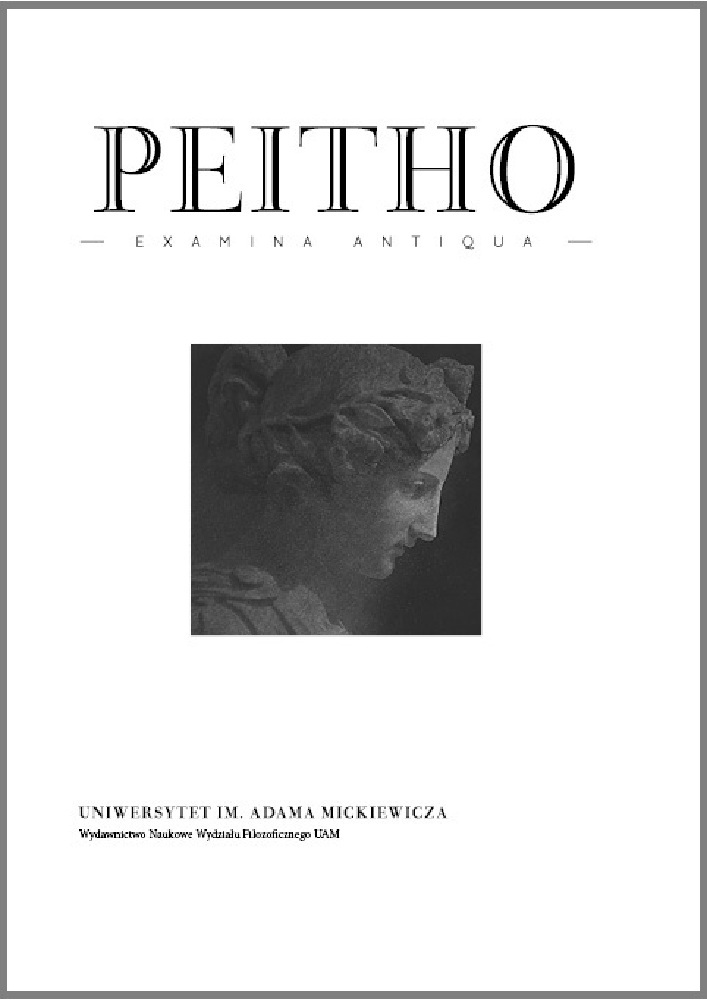Abstract
The question of the method was central in the thought and teaching of Prodicus. We have abundant information on this method but it is, probably, closely connected to various other issues (natural investigations, rhetoric and rhetorical theory, questions concerning the gods, ethics), on which we are less well informed. The right method to solve diverse linguistic problems comprised two moments and not just one as it frequently assumed. Similarly, the terms orthotes and diairesis of names, which appear in the sources, do not designate one single and simple procedure, but rather a double and more complex one, which is reconstructed in this article and whose objectives are clarified.
References
Brancacci, A., 1986, ”Les mots et les choses : la philosophie du langage chez Démocrite”, in: AA.VV., Philosophie du language et grammaire dans l’Antiquité, Bruxelles, pp. 9–28.
Brancacci, A., 1990, ”Le vrai et le droit : la notion d’orthon chez Mélissos”, in: J.-F. Mattéi (dir.), La naissance de la raison en Grèce, Actes du Congrès de Nice (mai 1987), Paris, pp. 197–206.
Brancacci, A., 1990, Oikeios logos. La filosofia del linguaggio di Antistene, Napoli.
Brancacci, A., 2002, ”Protagoras, l’orthoepeia, et la justesse des noms”, in: M. Dixsaut, A. Brancacci (éds.), Platon, source des Présocratiques. Exploration, Paris, pp. 169–190.
Brancacci, A., 2005, Antisthène. Le discours propre, Paris.
Calogero, G., 1957, “Gorgias and the Socratic Principle Nemo Sua Sponte Peccat“, Journal of Hellenic Studies 77, pp. 12–17.
Calogero, G., 1984, Scritti minori di filosofia antica, Napoli.
Cassin, B., 1995, L’Effet sophistique, Paris.
Classen, C. J., 1976, The Study of Language amongst Socrates’ Contemporaries, in: C.J. Classen (hrsg.), Sophistik, Darmstadt, pp. 215–247.
Couloubaritsis, L., 2008, La Pensée de Parménide. En Appendice: Traduction du Poème, troisième édition modifiée et augmentée de Mythe et Philosophie chez Parménide, Bruxelles–Paris.
Dixsaut, M., 1990, ”La rationalité projetée à l’origine”, in: J.-F. Mattéi (ed.), La naissance de la raison en Grèce, Paris, pp. 59–75.
Dumont, J.-P., 1986, ”Prodicos: de la méthode au système”, in: B. Cassin (éd.), Positions de la sophistique, Paris, pp. 221–232.
Gentinetta, P. M., 1961, Zur Sprachbetrachtung der Sophisten und in der stoisch-hellenistischen Zeit, Winterthur.
Giannantoni, G., 1963, Dialogo e dialettica nei dialoghi giovanili di Platone, Roma.
Hoffmann, E., 1925, Die Sprache und die archaische Logik, Tübingen.
Mayer, H., 1913, Prodikos von Keos und die Anfänge der Synonymik bei den Griechen, Paderborn.
Mayhew, R., 2011, Prodicus the Sophist. Texts, Translations, and Commentary, Oxford (repr. 2013).
Momigliano, A., 1929–1930, “Prodico da Ceo e le dottrine sul linguaggio da Democrito ai Cinici”, Atti della Accademia delle Scienze di Torino, Classe di Scienze morali, storiche e filologiche, 65, pp. 9–107.
Momigliano, A., 1964, Quarto contributo alla storia degli studi classici e del mondo antico, Roma, pp. 160–164.
Wesoly, M., 1985, “Le tecniche argomentative di Gorgia intorno alla tesi che nulla esiste”, in: L. Montoneri, F. Romano (cur.), Gorgia e la Sofistica, Atti del Convegno internazionale (Lentini–Catania, 12–15 dicembre 1983), Catania, pp. 311–341.
Wolfsdorf, D., 2011, “Prodicus on the correctness of names: the case of ΤΕΡΨΙΣ, ΧΑΡΑ and ΕΥΦΡΟΣΥΝΗ”, Journal of Hellenic Studies, 131, pp. 1–15.
License
Peitho provides immediate open access to its content on the principle that making research freely available to the public supports a greater global exchange of knowledge.
